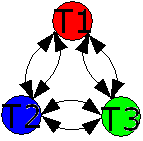Literature/1975/Pask
< Literature < 1975| Authors | ||
|---|---|---|
|
A B C D E F G H I J K L M N
|
| |
Wikimedia
- Conversation Theory regards social systems as symbolic, language-oriented systems where responses depend on one person's interpretation of another person's behavior, and where meanings are agreed through conversations. But since meanings are agreed, and the agreements can be illusory and transient, scientific research requires stable reference points in human transactions to allow for reproducible results. Pask found these points to be the understandings which arise in the conversations between two participating individuals, and which he defined rigorously.
Conversation Theory describes interaction between two or more cognitive systems, such as a teacher and a student or distinct perspectives within one individual, and how they engage in a dialog over a given concept and identify differences in how they understand it.
 The Derivation of a concept from at least two concurrently existing topics or concepts |
 Alternative derivations may be shown with conjunctive (AND) and disjunctive pathways (OR). This is logically equivalent to T1 = (T2 AND T3) OR (T4 AND T5) |
 Any two concepts can produce the third, shown as the cyclic form of three concepts -- note that the arrows should show that BOTH T1 and T2 are required to produce T3; similarly for generating T1 or T2 from the others. |
Chronology
- Wilson, Edward (1998). Consilience: The Unity of Knowledge. New York: Knopf. [+]
- Pask, Gordon (1996). "Heinz von Foerster's Self-Organisation, the Progenitor of Conversation and Interaction Theories." Systems Research, 13(3): 349–362. [+]
- Pask, Gordon (1993). Interactions of Actors (IA), Theory and Some Applications.
- Swanson, Don R. (1986). "Fish oil, Raynaud's Syndrome, and Undiscovered Public Knowledge." Perspectives in Biology and Medicine 30 (1): 7-18. [+]
- Simon, Herbert (1977). Models of Discovery: And Other Topics in the Methods of Science. Springer [+]
- Wilson, Patrick (1977). Public Knowledge, Private Ignorance: Toward a Library and Information Policy. Greenwood Publishing Group. [+]
- Kochen, Manfred, ed. (1975). Information for Action: from Knowledge to Wisdom. New York: Academic Press. [+]
- Pask, Gordon (1976). Conversation Theory, Applications in Education and Epistemology. Elsevier.
- Pask, Gordon (1975). Conversation, Cognition and Learning. Elsevier. [+]
- Pask, Gordon (1975). The Cybernetics of Human Learning and Performance. Hutchinson.
- Wilson, Edward (1975). Sociobiology: The New Synthesis. Harvard University Press. [+]
- Kochen, Manfred (1972). "WISE: A World Information Synthesis and Encyclopaedia." Journal of Documentation, 28: 322-341. [+]
- Kochen, Manfred (1969). "Stability in the Growth of Knowledge." American Documentation, 20 (3): 186-197. [+]
- Bernal, J. D. (1939). The Social Function of Science. London: Routledge & Kegan Paul Ltd. [+]
- Wells, H. G. (1938). World Brain. Garden City, NY: Doubleday, Doran & Co. [+]
- Ogden, C. K. & I. A. Richards (1923). The Meaning of Meaning: A Study of the Influence of Language upon Thought and of the Science of Symbolism. London: Routledge & Kegan Paul Ltd. [+]
Comments
Notes
This article is issued from Wikiversity - version of the Sunday, January 04, 2015. The text is available under the Creative Commons Attribution/Share Alike but additional terms may apply for the media files.
